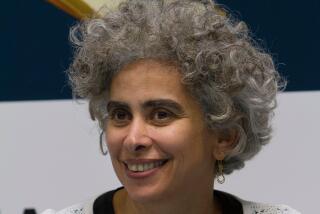Holocaust Scholar Well Received in Berlin
- Share via
BERLIN — The controversial U.S. scholar who has outraged critics by calling the Holocaust a “German national project” was embraced by a standing-room-only audience here Thursday, speaking to respectful citizens of the country that held his father in a concentration camp half a century before.
Daniel Jonah Goldhagen, a 37-year-old Harvard University political scientist, was in Berlin to promote the new German edition of “Hitler’s Willing Executioners: Ordinary Germans and the Holocaust.” The 600-page book argues that countless ordinary German citizens--and not just card-carrying members of the Nazi party--were willing to torture and murder Jews during World War II.
The book triggered an international debate when it appeared in English earlier this year, with critics complaining that Goldhagen had conducted his research unscientifically, left out important areas of inquiry and failed to address Germany’s many postwar efforts to atone.
The critics have also accused Goldhagen, the son of a Romanian Holocaust survivor, of bias and have blasted his core thesis: that anti-Semitism was a universal, guiding principle of German society until 1945.
But in Berlin on Thursday, when Goldhagen faced off with three German critics, the audience, which included Jews and non-Jews, appeared eager to support the embattled author.
“Good! He is correct!” gushed an elderly woman, a Lithuanian concentration camp survivor who would identify herself only as Mrs. Katz. Even today, she said, she didn’t want people in Berlin to know she agreed with Goldhagen, for fear of losing business contacts.
Ordinary Germans “knew exactly what they were doing” during the 1930s and 1940s, she said, deflating the common “we didn’t know” argument and echoing Goldhagen’s disturbing statement that “Regarding Jews . . . every German was inquisitor, judge and executioner.”
Although there was almost no publicity for the panel discussion, security guards outside the site, the Jewish Community of Berlin, had to turn away spectators.
Inside, many in the audience punctuated Goldhagen’s remarks with applause and snapped up signed copies of his book offered for sale on a table.
Released last month, the German edition of “Hitler’s Willing Executioners” is No. 4 on Germany’s bestseller list, compiled by Der Spiegel magazine. It has sold out in some bookstores.
At times, as the three German scholars tried to explain what they saw as the failures in Goldhagen’s work, the session took on the tone of a personal attack. Goldhagen heatedly defended himself, and members of the audience rushed to take sides.
Listeners gave their worst drubbing to Hans Mommsen, one of the most well-published and widely cited Third Reich scholars in Germany. Mommsen accused Goldhagen of looking at German history far too narrowly, focusing only on anti-Semitism as the driving force behind the Holocaust. He said that other key factors--including economic collapse, fear of communism and ignorance--had helped shape German behavior.
Goldhagen retorted that analyzing the Holocaust without focusing on anti-Semitism would be like writing a book on American slavery without paying any attention to racism. That answer won him loud applause.
Mommsen then attempted to suggest that the Germans serving as cogs in Hitler’s Holocaust machine had no idea of the extent of the evil that they were caught up in. Many in the audience groaned.
“Let me ask: Does anyone here, other than professor Mommsen, think that the people who were slaughtering the Jews weren’t aware of what they were doing?” demanded Goldhagen, and the groans turned into laughter and more applause. No one in the room raised a hand.
More to Read
Sign up for our Book Club newsletter
Get the latest news, events and more from the Los Angeles Times Book Club, and help us get L.A. reading and talking.
You may occasionally receive promotional content from the Los Angeles Times.










